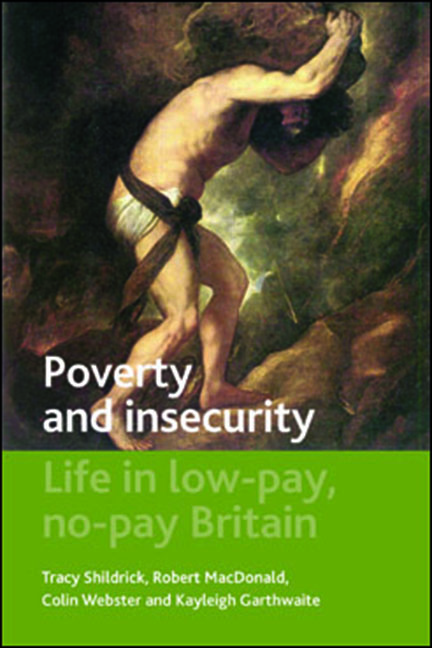Book contents
- Frontmatter
- Contents
- List of figures and boxes
- Acknowledgements
- 1 Introduction
- 2 Poor work, welfare and poverty
- 3 Researching the low-pay, no-pay cycle and recurrent poverty
- 4 The low-pay, no-pay cycle: the perspectives and practices of employers and ‘welfare to work’ agencies
- 5 The low-pay, no-pay cycle: its pattern and people's commitment to work
- 6 Searching for jobs: qualifications, support for the workless and the good and bad of informal social networks
- 7 Poor work: insecurity and churning in deindustrialised labour markets
- 8 ‘The ties that bind’: ill health and caring and their impact on the low-pay, no-pay cycle
- 9 Poverty and social insecurity
- 10 Conclusions
- References
- Index
5 - The low-pay, no-pay cycle: its pattern and people's commitment to work
Published online by Cambridge University Press: 07 September 2022
- Frontmatter
- Contents
- List of figures and boxes
- Acknowledgements
- 1 Introduction
- 2 Poor work, welfare and poverty
- 3 Researching the low-pay, no-pay cycle and recurrent poverty
- 4 The low-pay, no-pay cycle: the perspectives and practices of employers and ‘welfare to work’ agencies
- 5 The low-pay, no-pay cycle: its pattern and people's commitment to work
- 6 Searching for jobs: qualifications, support for the workless and the good and bad of informal social networks
- 7 Poor work: insecurity and churning in deindustrialised labour markets
- 8 ‘The ties that bind’: ill health and caring and their impact on the low-pay, no-pay cycle
- 9 Poverty and social insecurity
- 10 Conclusions
- References
- Index
Summary
Introduction
In this chapter we begin telling the story of life in low-pay, no-pay Britain, as revealed to us by those caught up in it. It has two main purposes: first, to describe the predominant shape of the low-pay, no-pay cycle and how this differed slightly for some participants; and second, to discuss commitment to employment. Thus, this chapter seeks to illustrate the overall shape of the work histories we uncovered and then, with a feel for the processes that underpin it, to describe the sort and level of motivations that those engaged in it had towards jobs. It begins with a reflection on what we learned of the earlier labour market experiences of the younger participants from previous research in Teesside.
The longer-term labour market careers of young adults: ‘stepping-stones to something better’ or ‘roads to nowhere’?
It has been well documented that youth transitions to the labour market in the UK have undergone radical restructuring (see, for example, Furlong and Cartmel, 2007). The movement from youth to adulthood is now understood to be more extended, fragmented, complex and individualised than was the case in the postwar decades, albeit that youth researchers often understate continuity in the experience of youth transitions (MacDonald, 2011). Vickerstaff (2003) and Goodwin and O’Connor (2005), for instance, have argued that in the ‘golden age’ of the 1960s and 1970s transitions could also be complicated and ‘non-linear’ and that we should not presume that the difficulties workingclass young people have in making smooth transitions to employment is a new phenomena. Nevertheless, Gill Jones (2002) reviews extensive research to describe how youth transitions have become polarised, with a widening ‘youth divide’ between a growing proportion of often more advantaged young people who now follow longer but successful ‘slow track’ transitions through further and higher education and those disadvantaged young people who leave school ‘early’, making ‘fast track’ transitions into the labour market, independent living and parenthood. Such transitions, typical of many working-class young people, are said to reflect and to add to social and economic disadvantage.
The Teesside Studies of Youth Transitions and Social Exclusion (see Chapter 3) have provided one of main empirical investigations of these sorts of ‘fast track’ transitions among particularly disadvantaged working-class young people in the UK.
- Type
- Chapter
- Information
- Poverty and InsecurityLife in Low-Pay, No-Pay Britain, pp. 79 - 100Publisher: Bristol University PressPrint publication year: 2012



